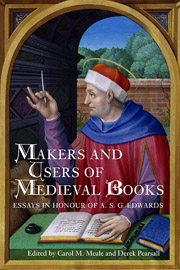Book contents
- Frontmatter
- Contents
- List of Illustrations
- Contributors
- Preface
- List of Abbreviations
- COMPOSITION
- COMPILATION
- Codicology, Localization, and Oxford, Bodleian Library, MS Laud Misc. 108
- The Fillers of the Auchinleck Manuscript and the Literary Culture of the West Midlands
- PRODUCTION
- OWNERS, PATRONS, READERS
- AFTERLIVES
- A. S. G. Edwards: List of Publications
- Index of Manuscripts and Early Printed Books
- General Index
- Tabula Gratulatoria
The Fillers of the Auchinleck Manuscript and the Literary Culture of the West Midlands
from COMPILATION
Published online by Cambridge University Press: 05 May 2014
- Frontmatter
- Contents
- List of Illustrations
- Contributors
- Preface
- List of Abbreviations
- COMPOSITION
- COMPILATION
- Codicology, Localization, and Oxford, Bodleian Library, MS Laud Misc. 108
- The Fillers of the Auchinleck Manuscript and the Literary Culture of the West Midlands
- PRODUCTION
- OWNERS, PATRONS, READERS
- AFTERLIVES
- A. S. G. Edwards: List of Publications
- Index of Manuscripts and Early Printed Books
- General Index
- Tabula Gratulatoria
Summary
In an influential chapter published in 1989, ‘The Manuscripts of the Major English Poetic Texts’, A. S. G. Edwards and Derek Pearsall note the paucity of evidence for pre-1400 activity (about thirty manuscripts) compared to the remarkable efflorescence that marks the post-1400 period (some 600 manuscripts). More recently, in 2008, Julia Boffey and A. S. G. Edwards trace ‘Middle English Literary Writings, 1150–1400’, describing the major pre-1400 books and concluding that the post-1400 expansion sprang from a bustling London environment, ‘where sufficient numbers of authors and copyists were located to facilitate the development of commercial and labour systems necessary to support a definable book trade’. The narrative of how the production of Middle English literary books eventually blossomed in England thus treads a steady course to London. Prior to that outcome there existed a locale already long active in the dissemination of Middle English texts, namely, the West Midlands.
To deepen our understanding of pre-1400 literary culture, I here set two scribes in closer collocation than has been customary in the scholarship. The first is scribe of the Auchinleck manuscript, active in London from about 1330 to 1340 and known solely by the book principally of English romances that he produced in collaboration with four other scribes. The second is the main scribe of British Library, MS Harley 2253, active in the Ludlow district from about 1314 to 1349 and known by his copying of legal writs and texts in three languages in three manuscripts. The overlapping texts of Harley and Auchinleck number only two: The Harrowing of Hell and The Sayings of Saint Bernard. However, when one spreads the contextual net to include with Harley a broader group of pre-1350 western anthologies, several patterns of canonical expectation begin to emerge.
- Type
- Chapter
- Information
- Makers and Users of Medieval BooksEssays in Honour of A.S.G. Edwards, pp. 60 - 77Publisher: Boydell & BrewerPrint publication year: 2014



